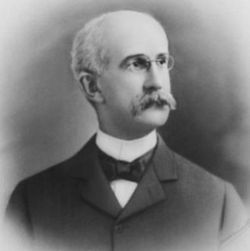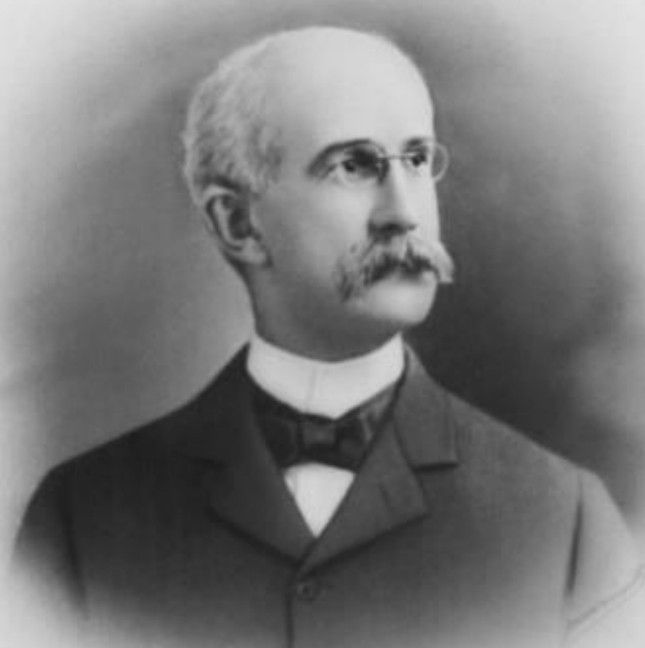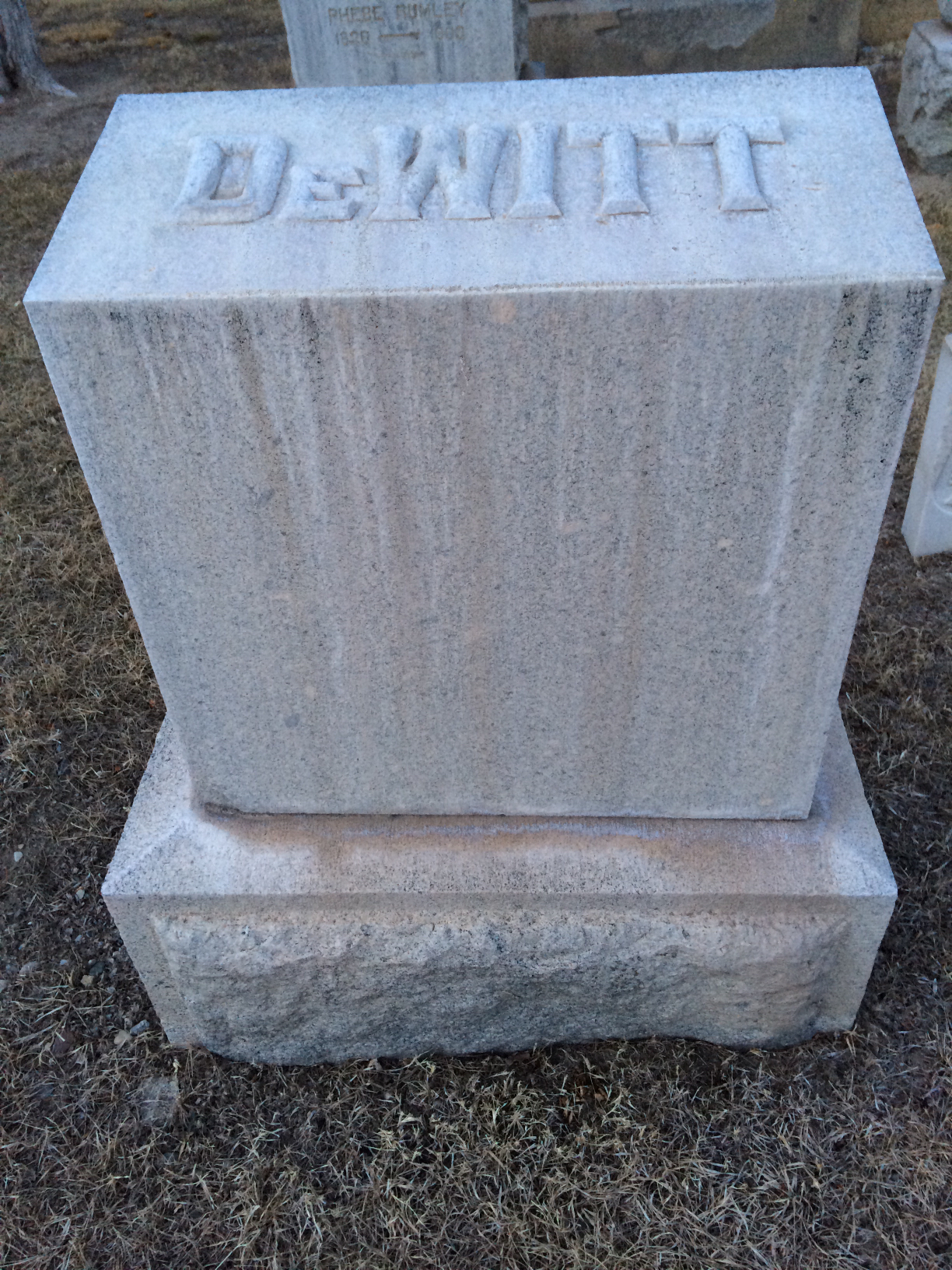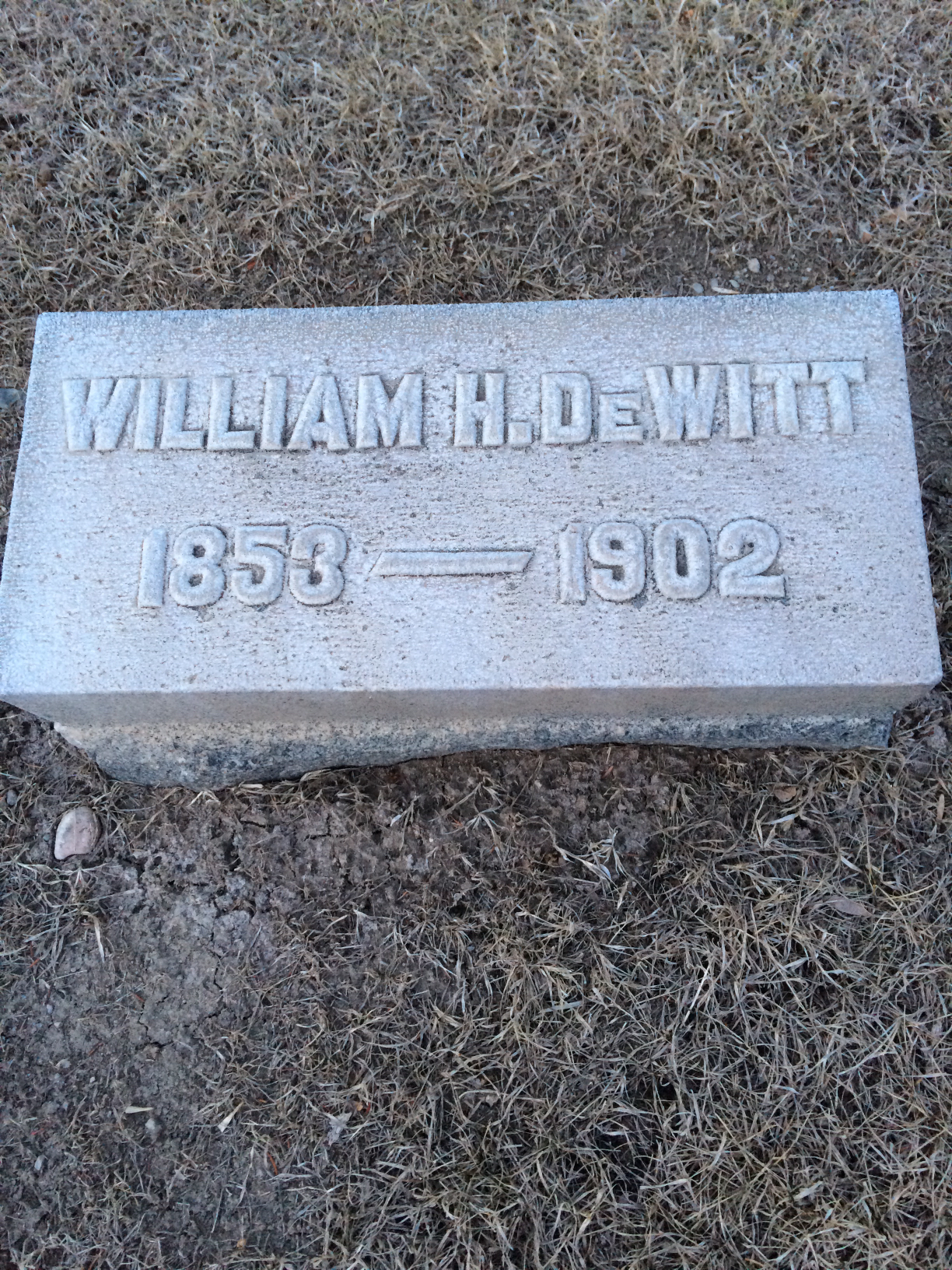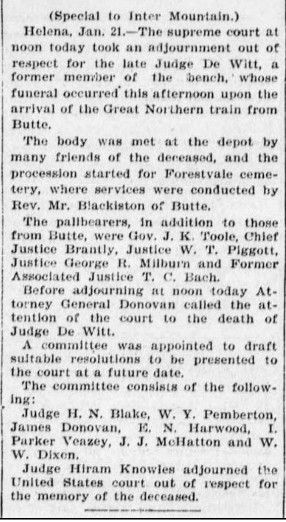Hon. William H. DeWitt. He was born in the city of New York, on March 16, 1853, the son of James R. and Alletta (Hedges) DeWitt. His parents were of Holland-Dutch extraction, and for six generations his ancestors were residents of New York and New Jersey. In 1871 he entered Hamilton College and was graduated from that school of high repute in 1875 with the degree of Bachelor of Arts. He then pursued a full three-years course in the law department of the Columbia University in New York city and in 1878 was honored with the degree of L.L. B. He was at once admitted to practice by the supreme court of the state, opened an office and entered upon his professional life in New York city. The desire to seek his fortune in the far west took possession of him, and, leaving the great metropolis, he came to Montana, arriving in Helena on May 24th, 1879. Here he established his home and entered upon active practice in the profession in which he was destined ultimately to hold distinction and prominence. For a time he was associated with the well known firm of Chumasero & Chadwick, remaining with it until he removed his residence from Helena to Butte, in May, 1881, and formed the law firm of Randolph & DeWitt. This firm was engaged in the successful practice of the law in Butte, having an extensive clientage in Silver Bow and adjoining counties, until its dissolution in 1884. In March 1883, Mr. DeWitt was tendered and accepted the appointment of United States district attorney for Montana, and discharged the duties with distinguished ability until the expiration of his term in July, 1885, (when) the law firm of DeWitt & Bach was then formed. In 1886 Mr. DeWitt was elected county attorney of Silver Bow county, being re-elected in 1888. In 1889, upon the admission of Montana as a state, he was elected one of the first three justices of the supreme court of the state receiving the only seven-year term provided for by the constitution. At the expiration of this term of office, he declined re-election, and resumed legal practice at Butte. An able and upright judge, he was widely known and admired for his ability, fairness, judicial acumen and equity. Judge DeWitt was a loyal member of the Republican party, (and) in 1900 his distinguished services to his party found fitting recognition in his selection as the Montana member of the Republican national committee. He held that position until his death, on January 18, 1902. On August 29, 1883, at Helena, Judge DeWitt married Miss Julia C. Rumley, a daughter of Hon. Charles Rumley. Their son, Rumley, is now approaching manhood and is attending school in New Hampshire.
~~
'The Butte Inter Mountain,' Butte, MT
20 January 1902, Image 1 (excerpts):
William Hedges DeWitt died of rheumatism of the heart at his home, 407 West Broadway, about 5 o'clock Saturday afternoon, and in his demise the city of Butte, the state of Montana and the entire nation have lost a noble and learned citizen. The death of Judge DeWitt was sudden and its announcement came as a shock to not only those who enjoyed the honor of his acquaintance and friendship, but also to those who knew of him.
About a year and a half ago Mr. DeWitt began to fail in health and a trip to a lower altitude was suggested. With his wife he went to Southern California where he remained several months. When he returned to Butte he weighed nearly 20 pounds more than he did when he left and was feeling better than he had at any time for many years, but close attention to business soon caused the return of the old symptoms. He never complained to any great extent, but would occassionally speak of not being well.
Everyone that knew Judge DeWitt loved him for his gentle disposition, dignified bearing, manliness, learning and sociability. He was one man in a million - the very soul of honor, a ripe scholar, a true friend, a polished and refined gentleman who knew not what it was to offend either by speech or action. He was learned on all matters pertaining to the welfare of mankind; a veritable encyclopedia of information on matters political and with which the law deals. He was easily approached and a charming conversationalist on matters which the higher mind deals. He loved his family and home and seldom spent his leisure moments anywhere except with his family.
Hon. William H. DeWitt. He was born in the city of New York, on March 16, 1853, the son of James R. and Alletta (Hedges) DeWitt. His parents were of Holland-Dutch extraction, and for six generations his ancestors were residents of New York and New Jersey. In 1871 he entered Hamilton College and was graduated from that school of high repute in 1875 with the degree of Bachelor of Arts. He then pursued a full three-years course in the law department of the Columbia University in New York city and in 1878 was honored with the degree of L.L. B. He was at once admitted to practice by the supreme court of the state, opened an office and entered upon his professional life in New York city. The desire to seek his fortune in the far west took possession of him, and, leaving the great metropolis, he came to Montana, arriving in Helena on May 24th, 1879. Here he established his home and entered upon active practice in the profession in which he was destined ultimately to hold distinction and prominence. For a time he was associated with the well known firm of Chumasero & Chadwick, remaining with it until he removed his residence from Helena to Butte, in May, 1881, and formed the law firm of Randolph & DeWitt. This firm was engaged in the successful practice of the law in Butte, having an extensive clientage in Silver Bow and adjoining counties, until its dissolution in 1884. In March 1883, Mr. DeWitt was tendered and accepted the appointment of United States district attorney for Montana, and discharged the duties with distinguished ability until the expiration of his term in July, 1885, (when) the law firm of DeWitt & Bach was then formed. In 1886 Mr. DeWitt was elected county attorney of Silver Bow county, being re-elected in 1888. In 1889, upon the admission of Montana as a state, he was elected one of the first three justices of the supreme court of the state receiving the only seven-year term provided for by the constitution. At the expiration of this term of office, he declined re-election, and resumed legal practice at Butte. An able and upright judge, he was widely known and admired for his ability, fairness, judicial acumen and equity. Judge DeWitt was a loyal member of the Republican party, (and) in 1900 his distinguished services to his party found fitting recognition in his selection as the Montana member of the Republican national committee. He held that position until his death, on January 18, 1902. On August 29, 1883, at Helena, Judge DeWitt married Miss Julia C. Rumley, a daughter of Hon. Charles Rumley. Their son, Rumley, is now approaching manhood and is attending school in New Hampshire.
~~
'The Butte Inter Mountain,' Butte, MT
20 January 1902, Image 1 (excerpts):
William Hedges DeWitt died of rheumatism of the heart at his home, 407 West Broadway, about 5 o'clock Saturday afternoon, and in his demise the city of Butte, the state of Montana and the entire nation have lost a noble and learned citizen. The death of Judge DeWitt was sudden and its announcement came as a shock to not only those who enjoyed the honor of his acquaintance and friendship, but also to those who knew of him.
About a year and a half ago Mr. DeWitt began to fail in health and a trip to a lower altitude was suggested. With his wife he went to Southern California where he remained several months. When he returned to Butte he weighed nearly 20 pounds more than he did when he left and was feeling better than he had at any time for many years, but close attention to business soon caused the return of the old symptoms. He never complained to any great extent, but would occassionally speak of not being well.
Everyone that knew Judge DeWitt loved him for his gentle disposition, dignified bearing, manliness, learning and sociability. He was one man in a million - the very soul of honor, a ripe scholar, a true friend, a polished and refined gentleman who knew not what it was to offend either by speech or action. He was learned on all matters pertaining to the welfare of mankind; a veritable encyclopedia of information on matters political and with which the law deals. He was easily approached and a charming conversationalist on matters which the higher mind deals. He loved his family and home and seldom spent his leisure moments anywhere except with his family.
Family Members
Sponsored by Ancestry
Advertisement
Advertisement
